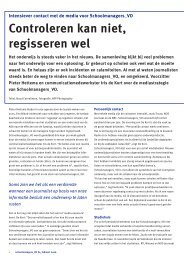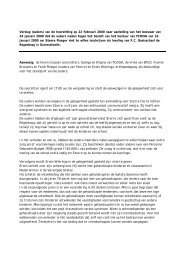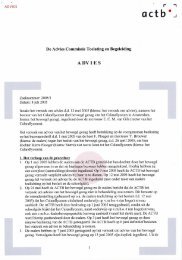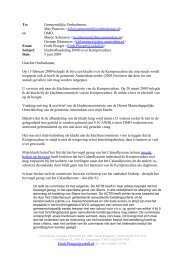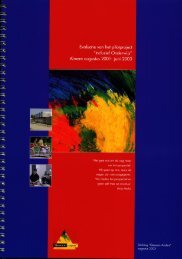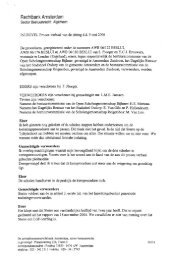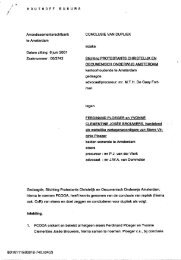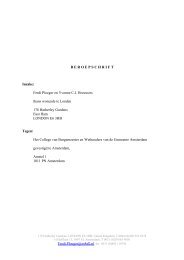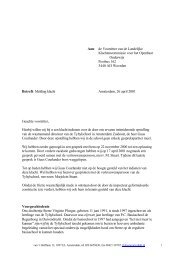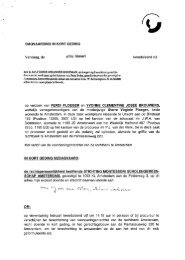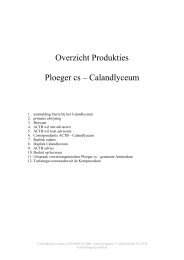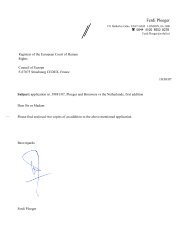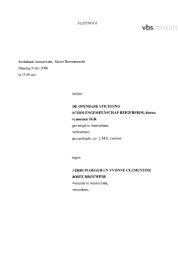2007-09-10, verzoekschrift
2007-09-10, verzoekschrift
2007-09-10, verzoekschrift
Create successful ePaper yourself
Turn your PDF publications into a flip-book with our unique Google optimized e-Paper software.
Het is de taak van de Staat om het keuzerecht van de ouders gestalte te geven. De Staat<br />
moet niet alleen rekening houden met religieuze of filosofische overtuigingen van ouders,<br />
maar moet hiertoe soms positieve maatregelen nemen. De keuze van ouders met een<br />
gehandicapt kind voor regulier onderwijs valt binnen de scope van ‘filosofische overtuigingen’.<br />
Hiervoor kan ook bij internationale normen aansluiting worden gevonden (zie<br />
15.16 e.v.).<br />
15.14 De keus van de ouders van Sterre voor regulier onderwijs sluit volledig aan bij de door de<br />
wetgever gemaakte keus en doelstelling. Van gewicht lijkt in de zaak Sterre het arrest<br />
Folgerø and others (29 juni <strong>2007</strong>, appl.nr. 15472/02), waarin het Hof wijst op de op de<br />
Staat rustende plicht pluralistisch onderwijs aan te reiken.<br />
(a) The two sentences of Article 2 of Protocol No. 1 must be interpreted not only in the<br />
light of each other but also, in particular, of Articles 8, 9 and <strong>10</strong> of the Convention (see<br />
Kjeldsen, Busk Madsen and Pedersen, cited above, p. 26, § 52).<br />
(b) It is on to the fundamental right to education that is grafted the right of parents to<br />
respect for their religious and philosophical convictions, and the first sentence does not<br />
distinguish, any more than the second, between State and private teaching. The second<br />
sentence of Article 2 of Protocol No. 1 aims in short at safeguarding the possibility of<br />
pluralism in education which possibility is essential for the preservation of the<br />
“democratic society” as conceived by the Convention. In view of the power of the modern<br />
State, it is above all through State teaching that this aim must be realised (see Kjeldsen,<br />
Busk Madsen and Pedersen, cited above, pp. 24-25, § 50).<br />
(c) Article 2 of Protocol No. 1 does not permit a distinction to be drawn between religious<br />
instruction and other subjects. It enjoins the State to respect parents' convictions, be they<br />
religious or philosophical, throughout the entire State education programme (see<br />
Kjeldsen, Busk Madsen and Pedersen, cited above, p. 25, §51). That duty is broad in its<br />
extent as it applies not only to the content of education and the manner of its provision<br />
but also to the performance of all the “functions” assumed by the State. The verb<br />
“respect” means more than “acknowledge” or “take into account”. In addition to a<br />
primarily negative undertaking, it implies some positive obligation on the part of the<br />
State. The term “conviction”, taken on its own, is not synonymous with the words<br />
“opinions” and “ideas”. It denotes views that attain a certain level of cogency,<br />
seriousness, cohesion and importance (see Valsamis, cited above, pp. 2323-24, §§ 25 and<br />
27, and Campbell and Cosans, cited above, pp. 16-17, §§ 36-37).<br />
(d) Article 2 of Protocol No. 1 constitutes a whole that is dominated by its first sentence.<br />
By binding themselves not to “deny the right to education”, the Contracting States<br />
guarantee to anyone within their jurisdiction a right of access to educational institutions<br />
existing at a given time and the possibility of drawing, by official recognition of the<br />
studies which he has completed, profit from the education received (see Kjeldsen, Busk<br />
Madsen and Pedersen, cited above, pp. 25-26, § 52, and Belgian linguistic case (merits),<br />
judgment of 23 July 1968, Series A no. 6, pp. 31-32, § 4).<br />
(e) It is in the discharge of a natural duty towards their children - parents being primarily<br />
responsible for the “education and teaching” of their children - that parents may require<br />
the State to respect their religious and philosophical convictions. Their right thus<br />
Ploeger en Brouwers - Staat der Nederlanden blz 27 / 478



